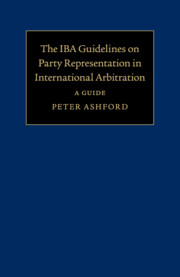Book contents
- Frontmatter
- Contents
- Dedication
- Preface and dedication
- Cases
- About the IBA Arbitration Committee
- The Guidelines
- Definitions
- Guidelines 1–3
- Guidelines 4–6
- Guidelines 7–8
- Guidelines 9–11
- Guidelines 12–17
- Guidelines 18–25
- Guidelines 26–27
- Appendix 1 Extract from the LCIA Arbitration Rules 2014 and Annex to the LCIA Rules
- Appendix 2 Interaction of IBA Rules with major professional conduct rules
- Appendix 3 Interaction of IBA Rules with major institutional rules
- Index
About the IBA Arbitration Committee
Published online by Cambridge University Press: 05 July 2016
- Frontmatter
- Contents
- Dedication
- Preface and dedication
- Cases
- About the IBA Arbitration Committee
- The Guidelines
- Definitions
- Guidelines 1–3
- Guidelines 4–6
- Guidelines 7–8
- Guidelines 9–11
- Guidelines 12–17
- Guidelines 18–25
- Guidelines 26–27
- Appendix 1 Extract from the LCIA Arbitration Rules 2014 and Annex to the LCIA Rules
- Appendix 2 Interaction of IBA Rules with major professional conduct rules
- Appendix 3 Interaction of IBA Rules with major institutional rules
- Index
Summary
Established as a Committee of the International Bar Association's Legal Practice Division, which focusses on the laws, practice and procedures relating to the arbitration of transnational disputes, the Arbitration Committee currently has over 2,600 members from 115 countries, and membership is increasing steadily.
Through its publications and conferences, the Committee seeks to share information about international arbitration, promote its use and improve its effectiveness. The Committee has published several sets of rules and guidelines, which have become widely accepted by the arbitration community as an expression of arbitration best practices, such as the IBA Rules on the Taking of Evidence in International Arbitration, as revised in 2010, the IBA Guidelines on Conflicts of Interest in International Arbitration, which are currently under revision, and the IBA Guidelines on Drafting Arbitration Agreements. The Committee also publishes a newsletter twice a year and organises conferences, seminars and training sessions around the globe.
The Committee maintains standing subcommittees and, as appropriate, establishes task forces to address specific issues.
At the time of the issuance of these Guidelines the Committee has – in addition to its Task Force on Counsel Conduct – three subcommittees, namely, the Investment Treaty Arbitration Subcommittee, the Conflicts of Interest Subcommittee and the Young Arbitration Practitioners Subcommittee.
- Type
- Chapter
- Information
- Publisher: Cambridge University PressPrint publication year: 2016
- 1
- Cited by



